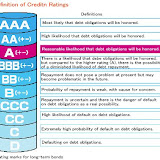Much is being made in the Labour-friendly press and media about the supposed strategic “U-turn” that is in progress in the spanking new halls at PN HQ. I will look into the fallacy of the “u-turn” argument in one of my next posts and will attempt to explain how rather...
Legatus non violatur
posted by Jacques René Zammit
The big three credit ratings agencies were threatened yesterday with fines and the creation of a new state-backed competitor, only weeks after European leaders attacked them for exacerbating Greece’s problems with downgrades. – The Times (UK) Readers will be familiar with...


